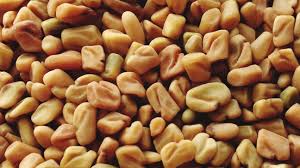Fenugreek seeds — also known as methi — are commonly used as a natural solution for thinning hair, dandruff, and dry or itchy scalp conditions.

Many beauty blogs and wellness outlets hail these seeds as the key to thicker, shinier hair.
This article explores whether fenugreek seeds can actually support hair and scalp health, and how to incorporate them into your hair care routine.
What Is Fenugreek?
Fenugreek is a small, leafy plant native to parts of Asia, Europe, and the Mediterranean region.
Both its leaves and brown seeds are used for culinary and medicinal purposes.
Historically, this herb has played a role in both Traditional Chinese Medicine and Ayurveda to:
-
Help stimulate labor
-
Aid in digestion
-
Soothe skin problems
-
Promote general well-being
Research published in 2011 also suggests fenugreek may benefit blood sugar levels, blood pressure, and body composition.
The seeds and leaves give off a strong, distinct smell and slightly bitter taste. They’re a regular ingredient in Indian, Middle Eastern, and North African dishes — found in spice blends, teas, soups, and stews.
Potential Hair Growth Benefits
Fenugreek seeds are naturally rich in iron and protein — two nutrients vital for hair development.
They also contain bioactive compounds such as flavonoids and saponins, which are thought to support hair growth due to their anti-inflammatory and antifungal effects.
Scientific evidence is limited, but a small study provides some backing for these claims. In a 2006 trial, 53 participants were given 300 mg of fenugreek seed extract daily for six months. Over 80% of those taking the supplement reported an increase in hair thickness and volume compared to the placebo group.
Still, more in-depth human research is necessary to confirm these findings and understand how effective fenugreek really is for treating hair thinning.
May Promote a Healthier Scalp
Fenugreek has been used traditionally to relieve dry, irritated skin — including symptoms of dandruff, which often leads to flaking and itching.
Dandruff may result from a variety of factors like excess oil, fungal infections, inflammation, or simply dry skin.
Although it’s not yet clear whether fenugreek targets all these issues, lab and animal studies have shown it possesses anti-inflammatory, moisturizing, antifungal, and skin-healing properties.
For example, in a small 6-week study, 11 participants used a skin cream containing fenugreek extract. They saw improvements in skin hydration and reduced redness. However, this cream was tested on the face, not the scalp.
While promising, more clinical research is needed to determine how fenugreek may be used effectively for scalp issues like dandruff.
Other Key Factors That Affect Hair Growth
Fenugreek alone may not be enough to improve hair health if other contributing factors are ignored. These include poor nutrition, high stress, hormonal changes, and genetics.
If you’re unsure of the reason behind your hair thinning, speaking with a healthcare provider may help uncover the root cause.
Nutritional Deficiencies
A well-balanced diet plays an important role in maintaining healthy hair. Lacking nutrients like iron, zinc, protein, or healthy fats can contribute to hair loss.
Some good sources of these essential nutrients include:
-
Protein: poultry, eggs, beans, fish, nuts
-
Healthy fats: avocado, seeds, olive oil, oily fish
-
Iron: legumes, spinach, red meat, dark chocolate
-
Zinc: dairy, shellfish, chickpeas, cashews
In some cases, supplements might be needed. However, it’s important to consult a healthcare provider first, as too much of certain nutrients can actually worsen hair shedding.
Stress and Daily Habits
Hair can also be affected by stress — whether emotional or physical. Constant tension from hairstyles, chemical treatments, or heat styling can weaken hair strands.
High cortisol levels, a result of stress, are believed to damage hair follicles and slow growth.
Free radicals — unstable molecules that cause oxidative stress — may also speed up aging and hair thinning.
To support healthy hair, try to manage stress effectively and eat a diet rich in antioxidant-rich foods like fruits, vegetables, and whole grains.
Genetics
Sometimes, hair thinning is due to hereditary conditions such as androgenetic alopecia. This form of hair loss is believed to stem from inherited genes or hormonal changes.
Currently, there’s no strong evidence that fenugreek or similar supplements can counteract genetic hair loss.
How to Use Fenugreek Seeds for Hair
While evidence is still emerging, fenugreek can be used both as a supplement and as a topical treatment.
Oral Supplements
Fenugreek supplements are available in powder or liquid extract forms. Common doses range from 300 mg of extract to 1,200 mg of seed powder per day.
The U.S. Food and Drug Administration (FDA) generally considers fenugreek safe as a food ingredient. Still, anyone pregnant, breastfeeding, or allergic to legumes like peanuts or chickpeas should avoid it or consult a healthcare provider first.
Applying to the Scalp
To apply topically, soak 2–3 tablespoons of seeds in water overnight. Once softened, blend into a smooth paste. This paste can be applied to the scalp directly or combined with ingredients like coconut oil, yogurt, honey, or milk for a nourishing mask.
Let the mixture sit on your scalp for at least 10–15 minutes before rinsing with warm water and using a mild shampoo.
Final Thoughts
Fenugreek seeds are widely used as a home remedy for issues like hair loss and dandruff.
While scientific backing is still limited, some evidence suggests they may support hair strength, scalp hydration, and even growth.
However, they should be seen as one part of a broader hair care approach — not a cure-all. Always check with a medical professional before adding supplements to your routine, especially if you have underlying health conditions or are pregnant.


I’ve been using fenugreek seeds for a while, and they’ve really helped improve the texture of my hair. Definitely noticed less hair fall!
I tried fenugreek seeds for a month, and honestly, I didn’t see any improvement in my hair. Maybe it works for some, but it wasn’t for me.
I’ve heard a lot about fenugreek’s benefits, and after using it, I definitely see a difference in the health of my hair. Will keep using it!